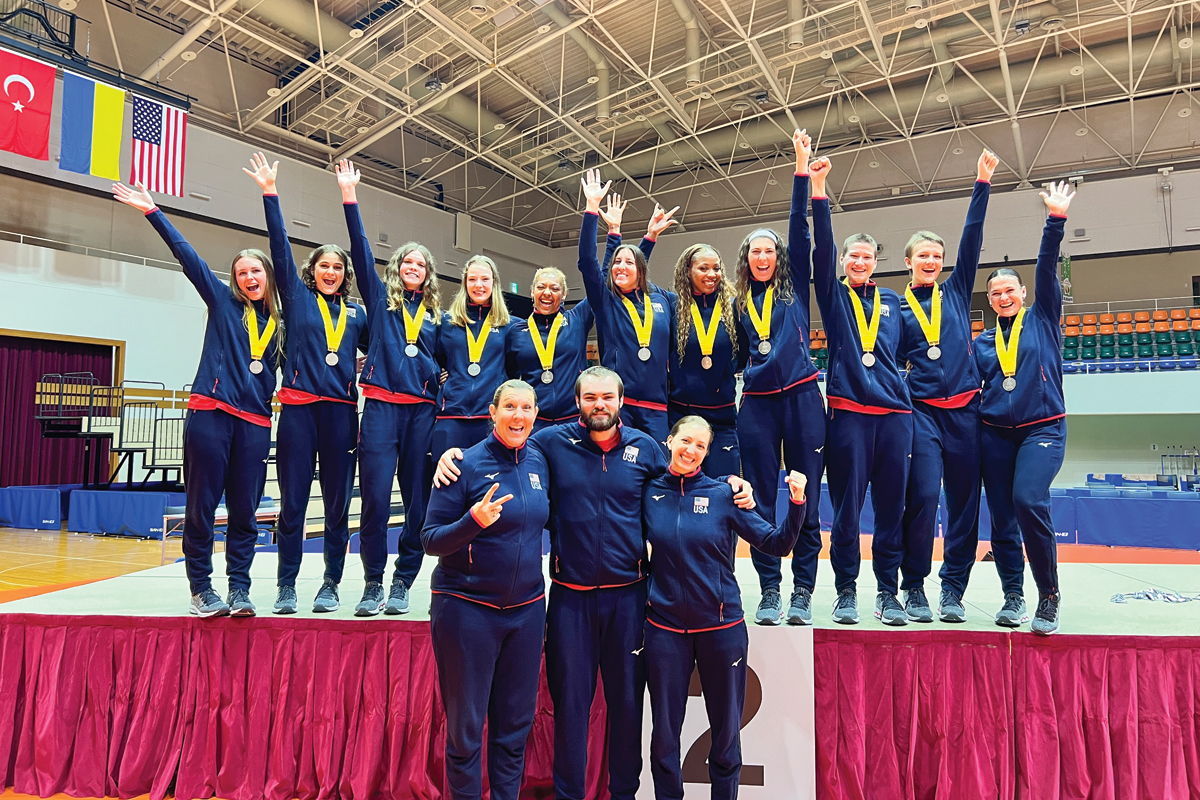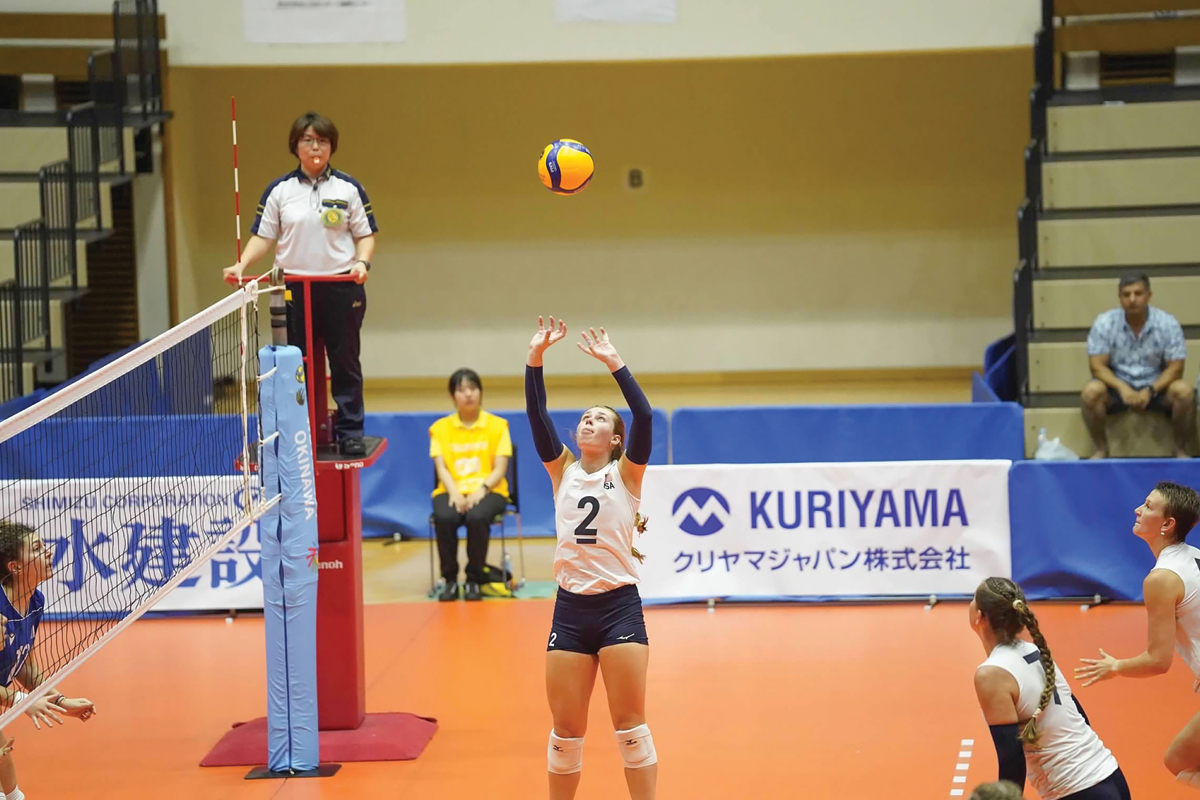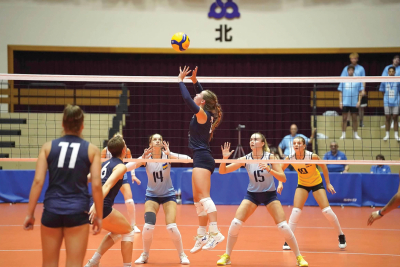From Sylva to Tokyo, Ella Gamble is making a name for herself on the volleyball court.
As she heads into her fourth and final year of college eligibility, Gamble, a Smoky Mountain High School graduate, is getting ready to pack her bags to head to the 2025 Deaflympics, to be held in Japan’s sprawling capital city.
Gamble’s parents Phillip and Carrie told The Smoky Mountain news that when their daughter was three years old, they found out that she couldn’t hear. She was diagnosed with bilateral central neural hearing loss, which is caused by damage or dysfunction in the auditory pathways to the brain. However, Gamble quickly learned from healthcare providers that with this type of hearing loss, their daughter could receive cochlear implants, which bypass the part of the ear that isn’t working, allowing someone to hear. Now, she can hear and speak well enough that a stranger likely wouldn’t notice any difference.
Around fifth grade, Gamble got into sports, and volleyball quickly emerged as her favorite. Her parents said that around the time their daughter was a freshman, she knew she wanted to play her chosen sport at a higher level.
“She has always been very determined, and it has been really rewarding to see that hard work pay off for her,” Carrie Gamble said. “It’s afforded her some really amazing life experiences as well as being able to play at a high level and represent the USA deaf team. It’s remarkable.”
After playing a couple of years at Carson Newman University, Gamble transferred to Gallaudet University, where she’s about to play one more season. Playing volleyball on a team mostly made up of women who communicate in sign language is somewhat new to Gamble, who is spending her summer in Washington, D.C., near Gualadette’s campus but grew up playing on teams where everyone could hear each other.
In volleyball, audible communication is important, especially between players in the front and back rows or simply someone calling “mine.” This is especially true for Gamble, a setter, meaning she is often the second of three players to hit the ball and therefore must be particularly aware of what her teammates are doing. Gamble said that while there were challenges playing at Smoky Mountain and Carson Newman since she still had some trouble in the moment deciphering who was saying what, it was initially even tougher to learn sign language well enough to adapt to playing the game with no audible cues from teammates whatsoever.

The USA deaf volleyball team took home silver medals two years ago in Okinawa and four years ago in Rio. Donated photo
Gamble said the key is to communicate between points and establish how the team will play the next point.
“That’s usually when I’ll tell them, ‘OK, let’s run this.’ Or they’ll tell me, ‘Hey, I want to try this,’” she said.
These interactions happen quickly, and the team has even figured out how to combine signs and use abbreviated signals to convey what’s about to transpire. Of course, unforeseen circumstances arise on the court, and that’s when practice and team chemistry come into play.
“We have to run a lot of situation-type stuff in practice so we understand when’s the best time to change something, because we can’t communicate during the point,” Gamble said.
But with that added challenge, Gamble said, comes a greater opportunity to bond with the women on the court, those who will be by her side during all those hard practice hours and eventually in Tokyo. She used this as a direct contrast from other sports, including basketball, which she also played growing up.
“It doesn’t matter how good you are, you still have to rely on your teammates,” she said.
Gamble said another thing about volleyball that’s underappreciated by some sports fans is that being good requires fine-tuned technical skills as well as a deep understanding of the game.
“I’m a setter, so my job is to run plays and know the strategy and understand how volleyball works on a more technical level, and I really enjoy that part of it, too,” she said.
The trip to Tokyo won’t be Gamble’s first time taking her game overseas. In 2022, she played in her first Deaflympics in Rio de Janeiro.
“Brazil was a culture shock in more ways than one,” she said.
First, there’s the obvious. For a young woman who’s never been outside the United States, going to the large South American city was a stark change, which she said was like a “whirlwind.” Perhaps even more noteworthy, the majority of her team communicated solely in sign language, something Gamble, who to that point mostly just spoke with others, wasn’t familiar with beyond the basics. She spent most of her time hanging out with a couple of her teammates who were in a similar situation and weren’t as familiar with sign language.
“The three of us were just like best buds,” she said.
Two years later, Gamble’s team traveled to Okinawa for the World Deaf Volleyball Championships, something she said was more manageable since at that point, she knew sign language well and was able to use the trip to better connect with all her teammates.

Gamble played in Okinawa a couple of years ago. Donated photo
During her time playing collegiately, as Gamble has learned to balance practice with a college team, the national team and schoolwork, she’s also grown as a leader. In fact, she has been the Team USA captain and her school team captain a couple of years now and is on track to become a coach.
“I’m now put into situations where I’m the one who has to deal with it, which is fantastic … and so I’m excited to see how all of that translates into coaching,” she said. “As a captain, I do take it upon myself to know a lot about volleyball and know a lot about my team, and so all I’m making myself do now as the captain is already preparing me for coaching, as well.”
Ann Whited Behm, head coach for both the Gallaudet and the national deaf team was, until recently, a player, and she had even planned on playing in Tokyo. But when the former head coach departed, Behm stepped into the role. This means that while November will mark Behm’s fourth Deaflympics, it’ll be her first as a head coach. When Behm took the head coaching role, Gamble filled the void she’d left as team captain.
“She gives her 100% during training/practices and her dedication to get better in all aspects is remarkable, but she is always willing to go the extra step to make the team around her better,” Behm said in an email. “Her level of understanding of the game is high and she can communicate efficiently with her teammates and coaches. Lastly, it is evident that everyone on the court trusts her to make any play on the court.”
Gamble said that while there are some nerves heading into Tokyo, she is confident. In Rio and Okinawa, the young USA Deaflympics volleyball team took home silver medals, and this time, they’re going for gold.
“I have a lot of confidence in the team and my teammates and even myself, and that comes from learning just through tough experiences,” she said. “When I transferred [to Gallaudet], it taught me so much about my confidence and who I am as a player, who I am as a person, and who I am as a leader. Some of these younger girls haven’t gone through that yet, and so I have some nerves about that, but we all need to work well together for us to get the gold.”


AloJapan.com